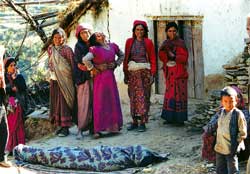 One of the techniques for belittling the horror of war is to measure it by casualty count, the toll of dead and wounded. Thus we have, almost as a mantra, the notion that Nepal's civil war has left around 8,000 people dead in the past seven and a half years. Several thousand Iraqis are said to have died in the Anglo-American lead invasion of their country earlier this year. A similar number of Afghans died in bombing by the US after the 9/11 attacks in New York City. About 2,800 were killed in that outrageous bit of terrorism. And so on.
One of the techniques for belittling the horror of war is to measure it by casualty count, the toll of dead and wounded. Thus we have, almost as a mantra, the notion that Nepal's civil war has left around 8,000 people dead in the past seven and a half years. Several thousand Iraqis are said to have died in the Anglo-American lead invasion of their country earlier this year. A similar number of Afghans died in bombing by the US after the 9/11 attacks in New York City. About 2,800 were killed in that outrageous bit of terrorism. And so on. Horror then, is quantified. It's a number, something we can easily deal with. Yes it's appalling to ponder that number itself. Eight thousand Nepalis who might otherwise be leading productive lives, raising families, having fun. Iraqi civilians who probably hated Saddam Hussein more than any American, now reduced to cinders and dust in the crater of a "bunker buster bomb". Nameless Afghan farmers and bazar merchants forgotten by all save their families. But numbers are easily forgotten.
An exception of course, is the World Trade Centre, Pentagon and Pennsylvania plane crash victims-thanks to the American media, we know a lot about these people. That crisis was deliberately personalised because everyone in North America, and in many other parts of the world, felt that the al-Qaeda attacks were personal, they were aimed at the innocent, and that includes all of us.
But I'd like to suggest that all violence is aimed at everyone, no matter how righteous its perpetrators, so we should know more about victims than the number of them. Who are these 8,000 Nepalis who were killed since the Maoists started their 'people's war' in February of 1996? We know of some of them, the higher ranking among them, and those who were killed in Kathmandu. They got their names in the papers. Occasionally a local stringer in Dadeldhura or someplace else will add detail to an otherwise sparse report of someone shot by Maoists or army. Those names are soon forgotten.
What we don't know anything about is the vast number of people in this country who have died. Ninety-five percent or more of this death toll of 8,000 are faceless, nameless, to most of the country. We are told on a daily basis that 22 Maoists were killed here, 17 there, a dozen or so in separate incidents in the east, west, north, middle hills and tarai. But we never, ever find out who these people are. We never get to ask crucial questions that could determine the outcome of this war. So let's draw up a list in the interests of peace, a series of questions that civil society should ask the security forces every time they announce so many rebels killed and leave it at that.
1) Who are the dead? Their names, ages, places of birth and residence.
2) What were the exact circumstances of their deaths?
3) What do their families say about them? Were they known to be Maoists?
4) If so, how did they come to be rebels? This is a key question.
5) What has been the impact of their deaths on family, community, perception of the rebels, government and situation as a whole.
6) Could this situation have been resolved without violence and if so, why wasn't it?
All fairly simple questions to answer, really. But I have doubts that they'll be addressed in the current climate of confusion, fear and militarisation. The world is getting worse, along with Nepal. We're losing our humanity, reducing conflict to an accountant's ledger and leaving morals in the hands of men with guns. The media is losing its ability to see past the press release or the offer to "embed" in the latest bit of state sponsored violence.But a few simple questions answered truthfully could just start to change things for the better.



